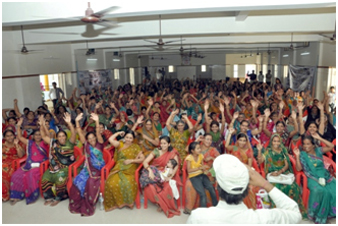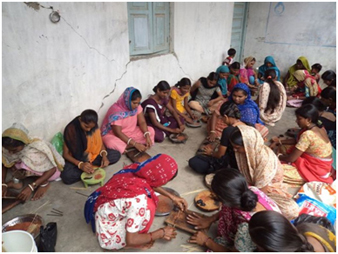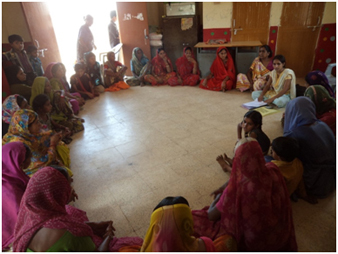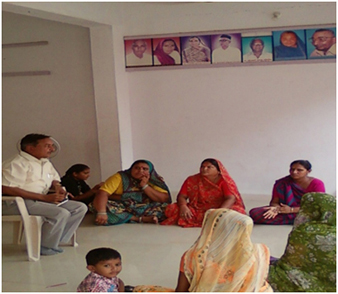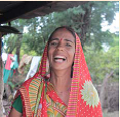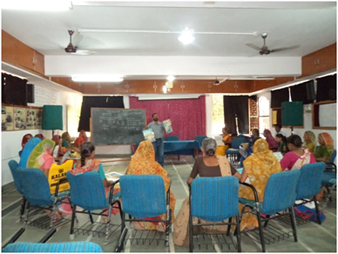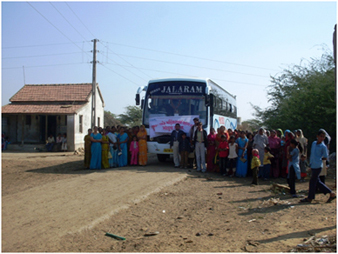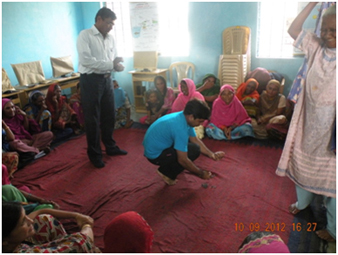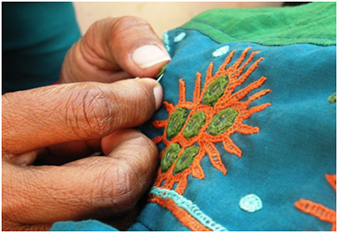The Kutch region of Gujarat, today, is representative of the synergistic relationship between corporates and communities working in tandem to facilitate holistic rural development. However, not too long ago, in the absence of developmental activities, the local communities of the region were dependent on grazing livestock or fishing to earn their livelihood. The most disadvantaged within the communities were women folk who were dependent on men with almost no access to improving their lives.
Pic: Group photo of SHG members
It was with intent to help improve the situation for women with economic empowerment that formation of self-help groups (SHGs) was introduced in the region. A SHG is a small voluntary association of people from the same socioeconomic background. They come together for the purpose of solving their common problems through self-help and mutual help. The SHG promotes small savings among its members.
With the support of reputed non-profit organisations and field operatives, these SHGs have brought about a real change in the lives of the women of the communities. The SHG women in this community have a space to share their concerns and avail of support for creating livelihood opportunities for women. SHGs have the potential to considerably improve income generation opportunities, skill up-gradation, participation in political processes, access to technical knowledge, access to nutrition & health care, self-confidence and self-reliance, organization and member mobilization, access to and control over resources. It has been successful to ensure equality in decision making, empowerment of women, equality in status, access to choice, reduced drudgery, improved literacy and awareness generation and the access to Right to Information (RTI).

Kusumba Jadeja, 40 years old, Tunda village
Bandhani Worker
“Self Help Groups have given us a voice that women couldn’t have before. It has lead to social harmony amongst different community members in the village. As a group we realized we are all working towards each other’s economic betterment. This group has led to higher savings and more internal lending. We have a democratic approach to give out loans to our members. We take loans for important occasions, health emergencies and for our children’s education. I am confident in dealing with financial issues now. Being a part of a larger group has given us confidence to voice our opinions to the Panchayat, about development and social issues in the village. We have received a Rs. 50,000 grant from the Government under the Mission Mangalam program which has given us a new spark of hope and light in our lives, made possible, because of CGPL”.
The first SHG was started at Vandh (Rabari Hamlet) of Tunda Gram Panchayat with 20 members. These women and 3 other men participated in the exposure visit to another functional SHG in Mithapur –Tata Chemicals Subsequently, 2 SHGs were formed in Tunda village with 20-25 women in each with a monthly saving of Rs. 100 per month per SHG member . Initial assistance and hand holding was provided by arranging meetings, collecting money, maintaining records and depositing money in bank accounts, among others. Women were trained in all these aspects and now manage the groups themselves.
Skill development training Income generation activity at village Tragadi under Utkarsh programme.
Progression of Self Help Groups (SHG)
Over a short course of time, the Mundra and Mandvi tehsil of Kutch has witnessed a remarkable increase in the number of SHGs to 33, from the first one that was created in Tunda Vandh village. The primary function of such groups is to form, join and manage various group activities while offering relevant technical support to help the group take on their new roles. This helps in facilitating a healthy and conducive environment for the local community. These groups are also strengthened through banks and market linkages, thus facilitating social security among the society at large. . These SHGs got convergence support of various govt sponsored program and scheme viz. Shakhi Mandal, Garib Kalyan mela and the capacity building through GLPC ( Gujarat Livelihood Promotion Company) .
Pic : Monthly meeting of SHG
Similar partnerships with several reputed NGOs namley VRTI, AKSRP have been forged M for formation and strengthening of SHG in the neighbouring villages.. Through forging partnership with reputed NGOs it is envisaged that more number of SHG of women would be formed in the vicinity.
Pic: orientation meeting for credit linkages with nationalized bank
Laxmiben Popatlal Rajgor , 38 year old , Mota Kandagara Village
SHG Group Member
“The benefit of being a part of a SHG is that all women are woven together and save in a combined fashion, loans are easily available and money is easily accessible. Before the SHG, I never took interest in financial matters as it was the job of the male counterpart in the family. I never had loans or insurance. Due to my SHG membership, I recently took a Rs. 20,000 loan for health reasons. The SHG has educated and trained us and we move out of the house more often. More opportunities for home based work should be created which will give us additional income and savings. Economic as well as social freedom of women needs to increase in the village and SHGs is a good step in that direction.”

Puranba Jadeja, 15 years old, Tragadi village (Respondent is hearing impaired and interview was taken with her family member)
Tie and Dye Cluster Member
“Puranba is my relative; she is deaf so she couldn’t study after 3rd standard as the teachers weren’t equipped with tools to teach her. She is a strong and confident girl who did not have a way to utilize her time and talent. She remained bored and frustrated before she undertook the tie and dye training organized by CGPL. She picked up the art very quickly and her speed is tremendous such that she doesn’t even need to constantly look at the cloth. She can now make productive use of her time while getting a steady income. This training has worked as a boon for her since she has an outlet to showcase her creativity. This has made her an earning member in our family and keeps her occupied, content, focused and happy.”
Imperatives of effective collaboration
While the field training partner NGO helps in skill enhancement and training, the corporate partner assists with building market linkages for the products, forward and backward linkages for the group, providing insurance and medical support, and initiating exposure visits, amongst others. The expertise of the corporate partner is especially valuable for:
- Facilitating market linkages through brand promotion
- Establishing bank linkages
- Providing life insurance and social security
- Providing Group establishment materials to the SHGs
- Establishing of SHG Index to measure effectiveness
- Regular training and capacity building of the SHG members on effective management of SHGs
- SHGs have been formed of Fisher women at Modhva
Dhanbai Hathi, 30 years old, Nana Bhadiya village
Embroidery Cluster Member
“Skill development is one of the best forms to equip women for livelihood options. I have been doing embroidery work from the last 12 months. I had no knowledge about different forms of embroidery but with the training from CGPL I now have perfected most of the forms. I now work from home and make a living. The training has helped me understand designs and color combinations better and now I give others suggestions on their designs too. These trainings have improved the quality of my work and products, thereby fetching me higher prices and income.”
Pic: Capacity building of SHG management
Pic: Exposure visit for members
Sea weed training program for the SHG members of fisher women of Modhva
The corporate partner also directly invests financially into the groups and schemes. A large chunk of its investments is directed towards the formation and grooming of SHGs for livelihood activities through various capacity building measures.
At present, with the partnerships of one corporate Mundra UMPP with field training NGOs, the total number of SHGs facilitated in the region is 38 covering 480 members in 8 villages. Total savings of Rs. 11,55,790 have been accrued by the groups. These SHGs are becoming the grooming ground for women leaders of the community.

The members of the groups have access to loans for their various needs such as:
- Housing
- Cattle purchases
- Education
- Capital for small businesses
- Medical purposes
- Family events and marriages
- Transport and vehicles
The community has now access to better knowledge and is empowered through:
- Better knowledge and expertise on effective savings
- Financial inclusion and banking services
- Increased savings and improved employment opportunities
- Formal credit linkages

